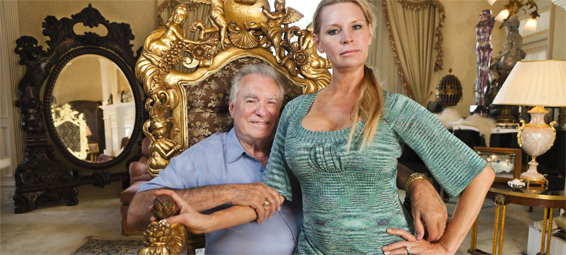The Queen of Versailles is one of those documentaries that remind you that sometimes the difference between a good documentary and a great documentary is based entirely on luck. When filmmaker Lauren Greenfield started shooting her film, she believed she was capturing a story about a wealthy Florida couple that was building the largest house in the United States. That was in 2007. Times were good. America was booming, George W. Bush was president, and Greenfield’s film would have been a story about the glut and excess, bad taste, bad manners, and tacky American consumption at its most grotesque. But how was Greenfield to know that months after she started rolling on the couple the bottom of the American economy would fall out?
The builder of the house, David Siegel, made his money selling timeshares, building an business empire that made him a billionaire on the backs of middle or lower-middle class Americans who poured their savings into a week or two of vacation a year during which they could pretend to live a luxurious life. But when the housing bubble burst, and cheap financing dried up, Siegel’s business could no longer function. In The Queen of Versailles, we see the strain this has on the Siegel’s lifestyle, marriage, family life, and personalities. As the queen, Jackie Siegel, announces at one point in the film, “it is a riches to rags tale.”
Or is it? Complicating the plot is the fact that if David was more flexible in his business practices, he might actually be able to afford his ridiculous lifestyle once more. And the Siegels never quite make it rags. Even in the depths of their situation, Jackie goes to Wal-Mart and loads her shopping cart with so much crap you can’t help but laugh at the conspicuous consumption of it all. The lingering effect, however, is how terribly sad it all is.
Greenfield’s film could have been a very different movie. It could have been snide or smug, preachy or dismissive. It could have easily taken the position that we find ourselves gravitating towards throughout the movie, that of complete shock at the blind vulgarity of the Siegel’s life, so much so that they become like monsters. (“Where’s the guillotine?” I found myself shouting at the screen at one point.) But Greenfield doesn’t assassinate her subjects; rather she largely stays out of the way, to let the camera capture life without judgment. We don’t need the filmmaker to tell us that a woman who asks the customer service rep at the Hertz car rental what the name of her driver is going to be is severely out-of-touch. But watching Jackie through the trials of the economic downturn something surprising happens. Despite her infuriating cluelessness, her offensive gluttony, and her shaky cowardice, we can see that somewhere beneath her massive and distractingly fake boobs is a heart, still beating and capable of a simple kind of love.





